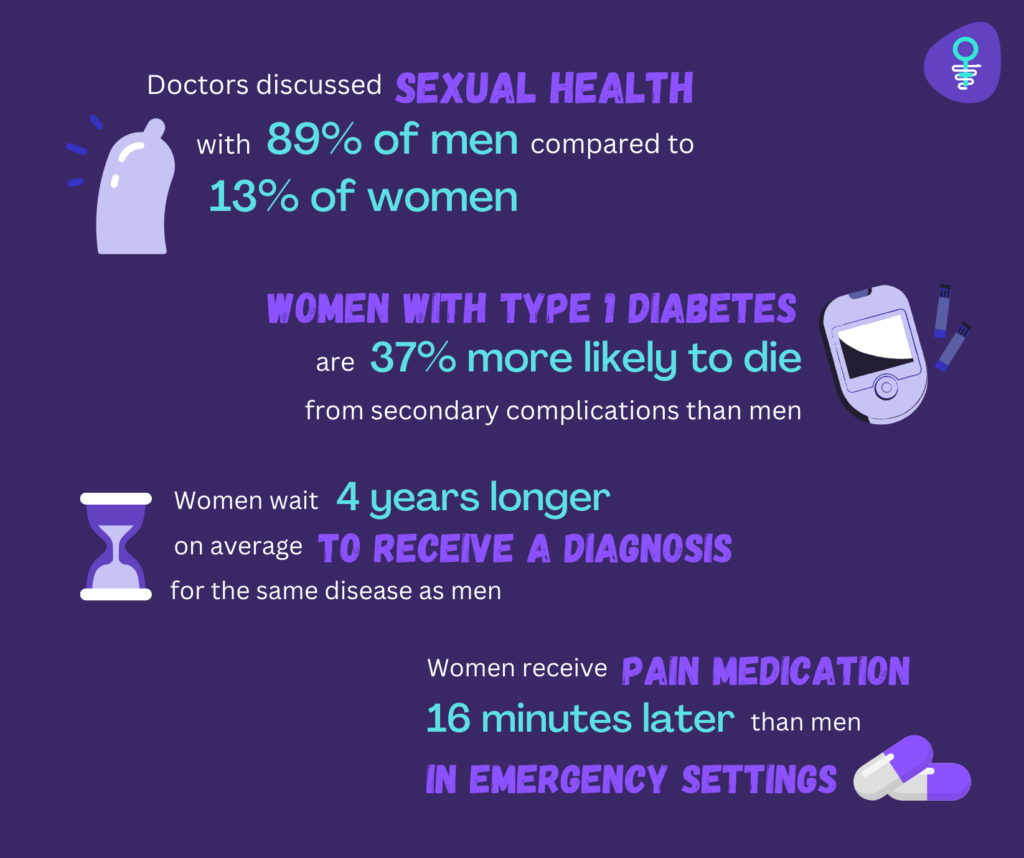
Modern medicine was not designed with women in mind. It was designed by men, for men, and specifically for a 70 kg white man. However, most of us do not fit that description. As a result, the healthcare system we rely on does not have the tools it needs to fully meet our needs. What does that mean concretely for women’s health?
Let’s take a look at a few examples:
- Doctors discussed sexual health with 89% of men compared to 13% of women
- Women with Type one diabetes are 37% more likely to die from secondary complications than men
- On average, women wait 4 years longer to receive a diagnosis for the same disease as men
- Women receive pain medication 16 minutes later than men in emergency settings
We can see that the “one size fits all” approach to medicine, which completely ignores the fact that prevalence and manifestation of diseases differs between men and women, makes women feel unheard and has catastrophic consequences for women’s health.
The different prevalences and manifestation of diseases between men and women logically should have an
- the diagnostic tools that are used
- how care is accessed,
- what is considered a ‘vital sign’
- what our definition of the baseline is what we screen for.
This is where FemTech comes into play, our tool to redesign healthcare.
How will FemTech redesign healthcare?
- FemTech will transform the way we collect healthcare data and how we use it.
The Gender Data Gap in healthcare is well-documented. For example, 70% of people impacted by chronic pain are women, yet 80% of pain studies are conducted on male mice or human men.. This large and glaring gap in our knowledge of women and their bodies is why it’s unsurprising that women are 20–30% more likely to be misdiagnosed than men. FemTech startups allow for the collection of important health datasets in real time, as well as the collection of data from a much wider and more diverse sample set of people than would otherwise be represented in clinical trials. This renders the information collected more insightful and widely applicable.
- FemTech will revolutionize how patients communicate with doctors
More than 40 percent of women who were eventually diagnosed with a serious autoimmune disease had been dismissed by doctors who said they were “just too concerned with their health or they’re a hypochondriac.” This dismissal of women by doctors is a fundamental problem that can lead to delayed diagnosis and treatment. One reason why women feel dismissed by doctors is that physicians are often not taught to recognize how symptoms of many diseases manifest in women, and they may lack the diagnostic tools to diagnose women correctly. By presenting doctors with data that supports their concerns, women may face less resistance in convincing doctors that something is wrong.
- FemTech is redefining inter-patient communication
The driving force behind the success of most FemTech startups is their effective communities. These are patient communities where women can gather to discuss similar challenges, share insights, and ways in which they have felt dismissed by the healthcare system. Patient communities are not unique to women’s reproductive health, but an integral part of healthcare as a whole. They allow patients to connect with others undergoing the same thing, learn from each other, and crowdsource solutions that can provide much-needed relief. FemTech startups play an interesting role in the space. They straddle the line between being healthcare providers and delivering a consumer good as a brand.
The applications of FemTech vary from chronic syndromes (e.g. endometriosis to sexual wellness, mental health and beyond.
